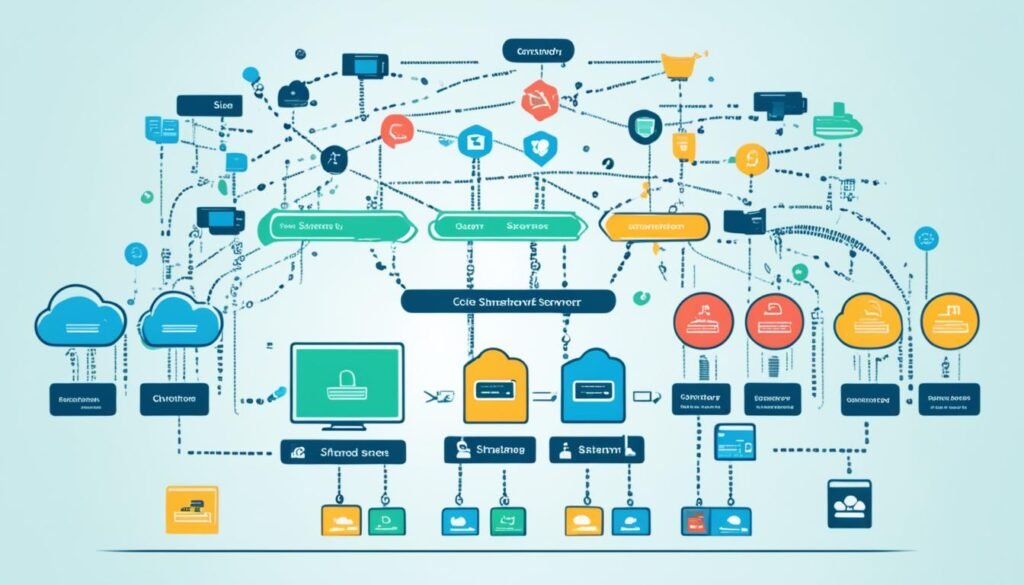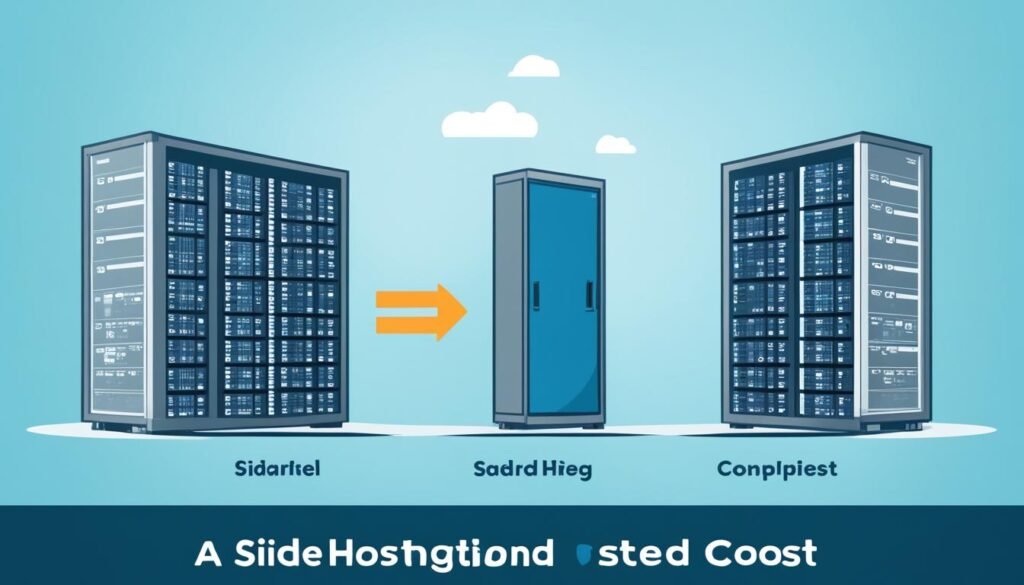Difference Between Dedicated And Shared Hosting: Choosing between dedicated and shared hosting is a big decision for those with websites. It’s important to know the key differences. This helps make a choice that fits your website’s needs. This article will show you the main points to consider when choosing your hosting type. By knowing these differences, you can confidently pick what’s best for you.
Key Takeaways
- Dedicated hosting provides an entire server just for one user or group. This means they get full control over it and can customize it how they want.
- Shared hosting, on the other hand, lets multiple websites use the same server. They share the server’s resources like CPU, memory, and storage.
- Dedicated hosting usually means better performance, security, and the ability to grow as you need to, more than shared hosting does.
- Shared hosting is typically cheaper. It’s great for small to medium-sized websites with not too heavy traffic.
- The choice between dedicated and shared hosting depends on website size, how much traffic you get, security needs, and if you want to customize your server.
Introduction to Web Hosting
In today’s world, being online is key. For both people and companies, web hosting is essential. It lets your website be seen and used by others on the internet. This service offers server space, resources, and structure, making your website work online.
What is Web Hosting?
Web hosting means you rent server space and resources from a provider. This provider looks after the server, ensuring it’s safe, reliable, and always ready to use. With a web hosting plan, your website’s files and more are kept on these servers. This makes your website available to anyone online.
Types of Web Hosting
In web hosting, there are choices to fit various needs. The main types are shared hosting and dedicated hosting.
- Shared Hosting: In shared hosting, multiple websites share one server. Each site gets some of the server’s resources like space, bandwidth, and power.
- Dedicated Hosting: With dedicated hosting, one user or organization has the entire server. This offers top performance, control, and customization since no other websites share the server’s resources.
Choosing between shared and dedicated hosting depends on your website’s traffic, budget, and how much control you want.
“The right web hosting solution can make or break the success of your online presence.”
No matter your website’s size or purpose, picking the right web hosting type is critical. It ensures your website runs well and serves its purpose, like for a blog, business site, or online store.
Shared Hosting Explained

In the web hosting world, shared hosting is a common and budget-friendly choice. Many websites share a single server’s resources. The hosting provider takes care of the server, doing tasks like updates and security.
How Shared Hosting Works
A shared server is split into many accounts. Each account gets a share of the server’s CPU, memory, and space. This way, it’s a cheaper option for hosting, giving each website some server power.
Pros and Cons of Shared Hosting
Shared hosting is good for those starting out or with small to medium sites. It’s affordable and easy to get. But, it brings a few trade-offs:
- Limited resources: Each site might feel slower during busy times because they share server resources.
- Shared security: A problem in one site could affect others sharing the same server.
- Lack of customization: You can’t change server settings much since the provider takes care of it.
Even with these challenges, shared hosting is still a top pick for many. It helps them start online and grow their presence without spending a lot.
“Shared hosting is a great option for small businesses and individuals looking to establish an online presence without the need for extensive resources or technical expertise.”
Dedicated Hosting Explained

Dedicated hosting means you have a whole server just for yourself or your organization. This setup offers better control, performance, and security. Now, let’s talk more about how it works and its key benefits.
How Dedicated Hosting Works
In dedicated hosting, one person or group controls everything about the server. You can install your own software and manage the hardware. This is very different from a shared server, where many people split the resources. This way, you get to use all the server’s power and space, making your website run better and more reliably.
Advantages of Dedicated Hosting
- Enhanced Performance: With dedicated hosting, you don’t have to share resources. This means your website can load faster and handle lots of visitors without slowing down.
- Improved Security: You also get to set up the server’s security yourself. This makes it much harder for anyone to hack your site, unlike with shared hosting.
- Increased Scalability: Dedicated servers can grow with your website. You can add more power and storage as your needs increase, keeping your site running smoothly.
- Customization Capabilities: You can customize everything on a dedicated server. From the software to the operating system, you can make it perfect for your needs. This improves your server’s efficiency and features.
Although dedicated hosting costs more than shared hosting, it’s worth it. The boost in performance, security, and the ability to grow are great for businesses and users with demanding websites or apps.
Difference Between Dedicated And Shared Hosting

When it comes to web hosting, dedicated and shared hosting are different in a few key ways. They differ in how they share server resources, what you can customize, the cost, how reliable and secure they are, and their scalability. This information helps businesses choose what’s best for them.
In shared hosting, you share the server’s resources like CPU, RAM, and storage with other sites. This can slow down your site if other sites on the server are very busy. Dedicated hosting gives you a whole server just for your website. Because of this, your site runs independently.
| Feature | Shared Hosting | Dedicated Hosting |
|---|---|---|
| Resource Allocation | Shared among multiple websites | Exclusive access to an entire server |
| Customization | Limited customization options | Extensive customization capabilities |
| Hosting Cost | Generally more affordable | Typically more expensive |
| Reliability | Dependent on the performance of other sites | Highly reliable, with minimal downtime |
| Security | Increased security risks due to shared environment | Enhanced security measures and control |
| Scalability | Limited scalability options | Highly scalable to accommodate growing needs |
The best choice, either shared hosting or dedicated hosting, depends on what your website or business needs. Shared hosting can be better for small or medium sites with regular traffic. Meanwhile, dedicated hosting suits businesses with bigger websites, more data, or which need more control and options.
No matter your choice, it’s crucial to review what your website needs. Then, match those needs with what each hosting plan offers. This ensures you pick the right hosting for your situation.
Resource Allocation and Performance
Web hosting is all about how you manage and use resources. It affects the performance and dependability of your website a lot. The main difference between shared and dedicated hosting is how they share and control resources. Each option comes with its own benefits and limits.
Shared Hosting Resource Limitations
In shared hosting, many sites share the server’s CPU, memory, and storage. When many sites use it at once, you might face shared hosting resource limitations. This can happen during busy times or if another site on your server gets a lot of visitors. If resources get stretched, your site might run slower, be less responsive, or even face downtime.
Dedicated Server Resource Exclusivity
Dedicated server resource exclusivity is unique to dedicated hosting. Here, an entire server is just for your website or group. You control all the resources. This means your site’s performance won’t be hurt by other users, ensuring a steady, reliable experience even under high loads.
| Shared Hosting | Dedicated Hosting |
|---|---|
|
|
The choice between shared and dedicated hosting depends on your site’s unique needs. Your traffic trends and resource must also be considered. Knowing the web hosting resource allocation differences can guide you to choose right. You want your website to perform well and grow smoothly.
Cost Considerations

Web hosting prices are really important to think about. Shared hosting and dedicated hosting each have their own price setup. They also have their pros and cons.
Shared Hosting Cost Benefits
Shared hosting is cheaper. Costs spread out among many users, making it affordable for small groups or individuals. This model uses economies of scale, keeping the shared hosting cost lower.
Dedicated Server Cost Factors
On the flip side, dedicated hosting cost is usually more. You pay for a whole server just for your site or group. The higher web hosting pricing for dedicated servers is because you get exclusive resources and extra support.
| Hosting Type | Average Monthly Cost | Factors Affecting Cost |
|---|---|---|
| Shared Hosting | $2.50 – $15 | – Server resources (CPU, RAM, storage) – Bandwidth and data transfer limits – Additional features (e-commerce, email, etc.) |
| Dedicated Hosting | $80 – $500+ | – Dedicated server hardware (CPU, RAM, storage) – Technical support and management – Bandwidth and data transfer limits – Additional managed services |
More expensive dedicated hosting means you have unique resources and more support. For many, especially those with complex needs, the extra cost is worth it.
“Shared hosting is an excellent choice for cost-conscious individuals and small businesses, while dedicated hosting offers more customization and control for enterprises with complex website requirements.”
Customization and Control
Web hosting allows for varying levels of control, depending on the type. Shared hosting limits what you can change because the hosting provider sets up the servers. You might only change some settings through a control panel.
Customization with Shared Hosting
Shared hosting means the provider handles everything about the server, like the OS and security. You get a control panel, like cPanel or Plesk, for basic site management. But, big changes to the server setup are usually off-limits.
Full Control with Dedicated Servers
Dedicated hosting offers complete server control. You can pick the operating system, add your software, and customize it to fit your needs. This is great for serious tech users who want to finely tune their hosting setup.
Having full server control is a key benefit of dedicated hosting. It lets users manage server performance, security, and other functions just how they need for their websites or businesses.
“With dedicated hosting, the sky’s the limit when it comes to customizing and optimizing your server environment to suit your specific needs.”
| Shared Hosting | Dedicated Hosting |
|---|---|
| Limited customization options | Unlimited customization capabilities |
| Managed by the web hosting provider | Full control over the server environment |
| Access to a control panel for basic website management | Ability to install custom software and configure the server |
Security and Reliability
Web hosting must be secure and reliable for both businesses and people who run websites. Deciding between shared hosting and dedicated hosting impacts your site’s safety and trustworthiness.
Shared Hosting Security Risks
Shared hosting has some security issues. This type of hosting lets many websites use the same server, sharing resources. So, a problem with one site can affect others on the server, leading to web hosting risks for everyone.
Dedicated Server Security Advantages
Now, dedicated hosting shines in security and reliability. It gives a single user or group their own server. This means you control the server’s settings and keep your site safe from shared hosting problems.
Plus, your website’s performance isn’t hurt by others. This special treatment boosts the security and reliability of your site.
“Dedicated hosting provides a higher level of security and reliability compared to shared hosting, as the server is exclusively reserved for a single user or organization.”
In the end, choosing between shared hosting and dedicated hosting is crucial for your site’s safety and dependability. Although shared hosting is cheaper, its risks and performance issues may not be worth the savings for those wanting a secure, reliable website.
Website Traffic and Scalability
When you pick a web host, think about how it will handle more traffic as your site grows. Shared hosting and dedicated hosting handle web traffic growth differently. This is key to consider.
Shared Hosting Traffic Limitations
Shared hosting environments can’t handle as much traffic. They share resources among many websites. So, high traffic times can slow down site speed, cause downtime, or frustrate visitors.
When your site’s traffic jumps, shared hosting might not cope well. It can lead to performance issues and challenges in growing your site. This is especially hard for businesses with rapid traffic increases or huge growth plans.
Dedicated Server Scalability
Dedicated hosting allows easy scaling of resources. You get exclusive use of server’s power and space. This means your site can handle more traffic without any slowdowns.
If your web hosting scalability needs increase, upgrading a dedicated server is simple. You can add more power, memory, or space. This keeps your site running smoothly, no matter the traffic or visitors’ count.
Dedicated hosting’s ability to upscale resources efficiently is its main strength. It’s great for sites expecting growth or having more variable traffic. Choosing a dedicated server means your site can stay fast and available, even as you grow your online and customer base.
Support and Management
The amount of support needed for web hosting varies between shared and dedicated plans. It’s key to know these differences. This helps you pick the right option for what you need.
For shared hosting, the provider handles most management duties. These include software updates, security, and server maintenance. This setup is good for those not very tech-savvy or who like a more hands-off approach.
Dedicated hosting needs more management and tech knowledge from the user. With a dedicated server, you manage tasks like software updates and security. You also have more customization options. This is great for users who want more control and have the skills to manage their hosting.
| Web Hosting Support | Shared Hosting | Dedicated Hosting |
|---|---|---|
| Software Updates | Handled by Provider | User Responsibility |
| Security Management | Handled by Provider | User Responsibility |
| Server Maintenance | Handled by Provider | User Responsibility |
| Technical Expertise Required | Lower | Higher |
If you need lots of web hosting support and management, shared hosting might suit you. But if you’re tech-savvy and want more control, a dedicated plan could be better.
Also Read: Maximizing The Potential Of Your Website With VPS Hosting
“The right hosting solution can make or break a website’s success, so it’s important to carefully evaluate your specific needs and choose the option that provides the optimal balance of support, management, and control.”
Conclusion
Choosing between shared and dedicated hosting depends on your website’s specific needs. Shared hosting is good for small businesses or personal sites with moderate visitors. It’s cost-effective. Dedicated hosting is better for sites with high traffic or that need a lot of resources. It offers better performance, security, and customization.
When you pick your hosting, think about your budget and what your website needs. If you’re tight on money but don’t need a lot of resources, shared hosting might be perfect. For sites needing lots of resources and customization, dedicated hosting is a better fit.
It’s essential to be well-informed when choosing hosting. Understand the differences between shared and dedicated hosting. This knowledge helps you make a decision that supports your website’s growth. By considering the pros and cons of each type, you can choose the best hosting for your site’s success.
FAQs
What is the main difference between dedicated and shared hosting?
Shared hosting lets many websites use the same server and its resources. Dedicated hosting gives a whole server just to one user or a group.
What is web hosting?
Web hosting is how you get your website online. You rent space on a server from a web hosting company.
How does shared hosting work?
On a shared server, many websites share the server’s resources. It’s like living in an apartment building, where you share the backyard and laundry room with your neighbors. The server is managed by the hosting provider for things like security and updates.
How does dedicated hosting work?
In dedicated hosting, a user or organization has a server all to themselves. They can control everything from the software to the hardware of the server.
What are the key differences between dedicated and shared hosting?
Dedicated and shared hosting differ in how resources are used, the option to customize, costs, reliability, and security. Shared hosting is cheaper, but you share resources. Dedicated hosting gives you all the resources but at a higher cost.
How do shared hosting and dedicated hosting differ in terms of resource allocation?
In shared hosting, resources are split between websites on a server. This can cause issues with too much traffic. Dedicated hosting makes all of a server’s resources available to one user, avoiding these problems.
How do the costs of shared hosting and dedicated hosting compare?
Shared hosting is less costly since many share one server’s expenses. Dedicated hosting is pricier because you get the entire server to yourself.
What are the differences in customization and control between shared and dedicated hosting?
With shared hosting, you can’t change much because the provider does most of the management. But with dedicated hosting, you control everything, including the operating system and software.
How do shared hosting and dedicated hosting differ in terms of security and reliability?
Shared hosting can be less secure, as problems with one site can affect others on the same server. But a dedicated server is more secure and reliable because you’re the only user. The performance of your site won’t be influenced by others.
How do shared hosting and dedicated hosting differ in terms of website traffic and scalability?
In shared hosting, your site might slow down if too many people visit at once. Dedicated hosting gives you the ability to expand your server resources to handle more traffic, keeping your site running smoothly.




